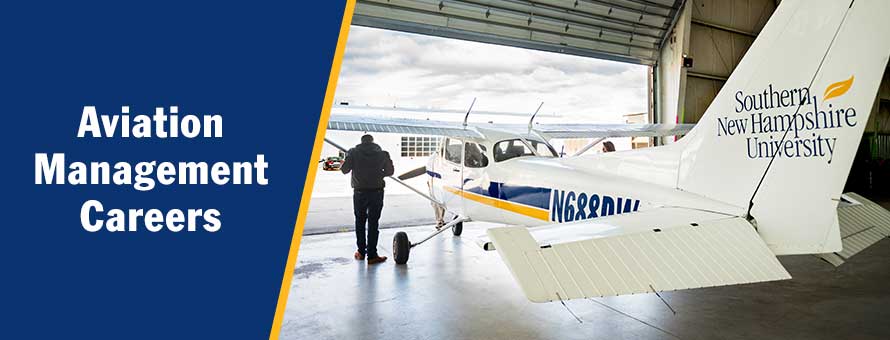The Sky Is the Limit: Types of Airport Jobs and Aviation Careers

Understanding the Numbers
When reviewing job growth and salary information, it’s important to remember that actual numbers can vary due to many different factors — like years of experience in the role, industry of employment, geographic location, worker skill and economic conditions. Cited projections do not guarantee actual salary or job growth.
There are many types of airport-based jobs in the aviation industry allowing you to work in a wide variety of roles. Some of those roles include:
- Pilot, co-pilot
- Air Traffic Controller
- Aircraft and Avionics Mechanic
- Airport Manager
- Transportation Security Screener
- Airfield Operations Specialist
- Aeronautical Engineer
Richard O'Loughlin dreamed of being a pilot for as long as he can remember. While his friends were busy earning their drivers' licenses, O'Loughlin was earning his pilot's license. But after completing an aviation degree and a commercial pilot certification in the 1990s, he discovered there weren't many available pilot jobs at that time.
Instead, O'Loughlin turned his sights to aviation management jobs, and soon found work at Boston's Logan Airport. He started as an assistant but worked his way up through the management ranks over his more than 20 year career, ultimately serving as Logan's airport manager.
Today, O'Loughlin is an aviation operations administrator at Southern New Hampshire University's (SNHU) College of Engineering, Technology and Aeronautics and said his experience is an important reminder that there are many points of entry to aviation careers beyond working as a pilot.
"For every one pilot, there's 90 people that are under them and that are supporting the mission the pilot is doing," he said.
If you're passionate about flying and want to play an important role in the growing aviation field, learn more about the types of airport jobs available and get tips for preparing for aviation management careers from SNHU aviation instructors.
What is Aviation Management?
With a degree in aviation management, you could oversee the day-to-day operations of an airline, an airport or a group of airport maintenance workers. Aviation managers can also work in the aeronautical engineering field, overseeing aircraft production.
Aviation is a growing field, with a large number of opportunities projected to be available in the coming years.
The need for private and commercial pilots, in particular, is projected to skyrocket over the next two decades, as many of today’s pilots retire and airlines prepare to release new aircraft.
Boeing projected that aviation will need 790,000 new pilots by 2037 to meet growing needs, according to a 2018 Forbes article. And pilots aren't the only aviation management jobs in high demand.
According to a 2018 survey of more than 100 human resource professionals from the International Air Transport Association (IATA), high numbers of ground operations personnel, customer service personnel and cabin crew will also be needed in the next decade.
The survey found that in the next 10 years 81% of respondents expect growth in ground operations jobs, 70% expect growth in customer service jobs and 70% expect growth in cabin crew jobs.
While much of this demand can be explained by the growth of the airline industry and air traffic passengers worldwide, the IATA report also suggests that there is a lack of properly trained workers in many of these key aviation roles.
Earning an aviation management degree is a great first step to getting the training you need to see yourself succeed in one of the many in-demand aviation careers.
Types of Airport Jobs
If you’re ready to enter the aviation field, it’s important to have a strong understanding of aviation management jobs available and aviation management salary potential.
- Pilots, Co-Pilots and Flight Engineers: With a pilot's license, you can work as a commercial pilot or airline pilot, according to the U.S. Bureau of Labor Statistics (BLS). A commercial pilot does not require a college degree, and pilots unscheduled flights such as private, corporate or charter flights and may also be responsible for loading baggage and greeting passengers. As an airline pilot, you could work for an airline that transports passengers and cargo on a fixed schedule. Airline pilots typically require a bachelor’s degree and the FAA-issued Airline Transport Pilot (ATP) certificate, according to the BLS. The median wage for commercial pilots was $78,740 in 2017, while airline pilots earned a median wage of $137,330 in 2017, BLS data shows. The aviation industry projects a large increase in available pilot jobs within the next 20 years.
- Air Traffic Controller: As an air traffic controller you can help monitor and direct the movement of aircraft on the ground and in the air, issuing landing and takeoff instructions to pilots and communicating with flight and response crews in the event of an emergency. BLS data predicts air traffic control will remain a competitive field, with only 3% job growth expected by 2026. In 2017, air traffic controllers earned a median salary of $124,540, according to BLS data.
- Aircraft and Avionics Mechanics: As an aircraft mechanic, you’ll play a key role in the safety of airplane crew and passengers by examining, diagnosing and repairing electrical and mechanical problems. Aircraft mechanic jobs are projected to grow 5% by 2026, and earned a median salary of $61,020 in 2017, according to BLS data.
- Airport Managers: As an airport manager, you’ll be responsible for overseeing the behind-the-scenes work of an airport, including maintenance and safety of the airfield, airport and airspace capacity management and airline scheduling. According to BLS data, general and operations managers earned a median salary of $100,410 in 2017.
- Transportation Security Screener: Interested in airline security? You could work for the Transportation Security Administration (TSA) screening passengers, baggage or cargo to ensure compliance with security regulations. According to the BLS, there were 42,470 transportation security jobs in 2017, with screeners earning an median salary of $40,580. In July 2018, the TSA announced plans to encourage career progression for current TSA workers, opening up new opportunities across the country.
- Airfield Operations Specialists: As an airfield operations specialist, you can help ensure the safe takeoff and landing of aircraft, coordinating between air-traffic control and maintenance personnel to implement airfield safety procedures. According to BLS data, there were about 8,760 airfield operations specialist jobs in 2017, earning a median salary of $48,910.
- Aeronautical Engineer: What is aeronautics? With a job as an aeronautical engineer, you can play a key role in the design, analysis, development and manufacturing of aircraft. Aeronautical and aerospace engineers earned a median salary of $113,030 in May 2017, according to the BLS. BLS data projects aeronautical engineering jobs will grow 6% by 2026 as airlines work to produce quieter, more efficient aircraft.
Getting Started in Aviation Careers
Are you curious about what it takes to get started with an aviation career? While the training needed for airline management jobs and other aviation careers can vary widely, there are some basic personality traits that are important across the industry, said O'Loughlin.
"Communication is very important," he said. "You have to have good communication skills and work well with others. There is no choice in this business, and no room for people that can't communicate efficiently, quickly and safely. Communication is the core of what runs this business."
The ability to think critically and rationally and practice strong leadership - especially in times of emergency - is also important across the aviation field, said Major Larowe, an assistant professor of aviation management with more than 30 years of experience in piloting and aviation management.
Developing these skills in an aviation degree program and through hands-on professional experience is key for preparing for a career in aviation and aeronautics.
If you're interested in becoming an air traffic controller, a bachelor's degree in air traffic management can give you the skills you need to work toward your air traffic controller certification. An aeronautical engineering degree offers a great start toward a job in the design and production of aircraft. A degree in aviation management prepares you to oversee operations at an airport or for an airline company, while an aviation operations degree prepares you to become a pilot.
While your degree is a great first step toward a career in aviation management, it's also important to seek opportunities to advance your industry knowledge and real-world aviation experiences.
Peter Wyman, as assistant professor of aviation management, said having prior experience operating an aircraft or working around aircraft can be especially beneficial when seeking employment across the aviation industry.
Attending aviation conferences, joining professional and career associations and finding internships can also help you network within the field and gain real-world experience, Larowe said.
No matter what aviation career path you hope to take, it's important to always focus on furthering your knowledge and honing your leadership skills.
"Aviation has no pause button," Larowe said. "Aviation has no shoulder of the road to pull over on when something is wrong. Aviation has to think through the whole situation long before an aircraft takes off in order to be successful and to be safe."
Danielle Gagnon is a freelance writer and marketer focused on higher education. Connect with her on LinkedIn.
Explore more content like this article

What Can You Do with an Associate Degree in Information Technology?

How to Become a Software Engineer

What is Hour of Code? A Chance to Kickstart Your Coding Literacy
About Southern New Hampshire University

SNHU is a nonprofit, accredited university with a mission to make high-quality education more accessible and affordable for everyone.
Founded in 1932, and online since 1995, we’ve helped countless students reach their goals with flexible, career-focused programs. Our 300-acre campus in Manchester, NH is home to over 3,000 students, and we serve over 135,000 students online. Visit our about SNHU page to learn more about our mission, accreditations, leadership team, national recognitions and awards.

